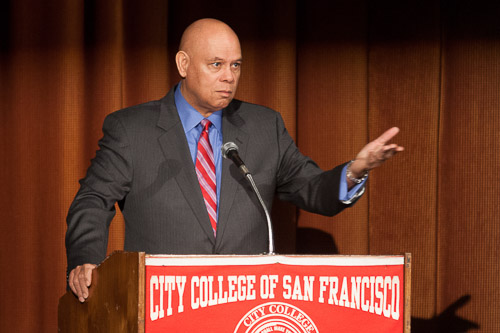Chancellor acknowledges error with administration pay raises

By Charles Innis/The Guardsman
While students had the day off for a flex day Feb. 6, 250 faculty and staff members crowded into the Diego Rivera Theatre where Chancellor Arthur Tyler addressed recent controversies about high administrative salaries.
Tyler acknowledged that City College hired three vice chancellors at a pay rate above the official published salary. The admission has left a bitter taste among the college faculty and an air of distrust between the two parties.
The acknowledgment came after a week of controversy regarding a resolution submitted by Special Trustee Robert Agrella on Jan. 24 to modify the salary range of the vice chancellor, associate vice chancellor and chief information technology officer.
The new range would have brought their salaries to over $200,000. It was abruptly expunged from the agenda after a barrage of complaints by angry faculty and staff.
Despite the rain, over 50 faculty members of American Federation of Teachers Local 2121 congregated outside the theater’s entrance at 9 a.m.
They held banners with such messages as “Cut Admin Not Classes” and “Restore Classes and Faculty Pay” prior to Tyler’s speech.
The rally’s written agenda listed several other items of complaint, including “draconian class cuts,” “lack of clarity and transparency” and the re-installation of the Board of Trustees.
Faculty members piled into the theater, while many others were redirected to overflow rooms in the Visual Arts building, where Tyler’s address was projected on-screen.
An atmosphere of animosity pervaded the theater, with protesters standing near the back of the theater holding signs and faculty members hissing, scoffing and looking upon Tyler’s address with expressions of disgust.
Tyler began his address by confronting the much-disputed salary modification proposal that infuriated the faculty.
“There was nothing nefarious in the purpose of that resolution,” Tyler said. “It was simply to try to correct something that existed.”
Although the newly-hired vice chancellors did not receive raises, they were hired at a pay rate above the official schedule, a fact that had been concealed.
The three new positions are purported to be making 10 to 13 percent more than the official salary rate, according to records obtained by the San Francisco Chronicle.
“Yes, we had three administrators that had been put on a scale above the one that was published,” Tyler said. “That should have been public.”
Tyler then issued a pledge to the faculty members.
“I hereby tell you that from now on every single resolution that hires a person in this institution will have their salary posted,” Tyler said.
Tyler claimed responsibility for obscuring the administrators’ actual pay from the public.
“I own every single error that everybody makes in this institution,” Tyler said. “I’Il own the mistakes and I’m not going to run from that.”
The resolution to alter the salary schedule was initially proposed by Tyler in order to comply with an audit by the State Teachers’ Retirement System, an organization that provides retirement, disability and survivor benefits for teachers.
“There was not in the board resolution that hired them a statement of their salary, which means those people cannot receive STRS credit for the time that they are here until that happens,” Tyler said.
Engineering Department instructor Wendy Kaufmyn said the vice chancellors would still collect retirement benefits from the State Teachers’ Retirement System if the salary schedule remained unaltered.
“They just won’t get the extra that their salary is above the posted schedule,” Kaufmyn said.
Tyler didn’t specify why the vice chancellors were hired above published salary pay in his address and some faculty believe there are still many questions that remain unanswered.
Disputes surrounding the concealed salary rate have raised questions among staff regarding the equity of having a single “special trustee with extraordinary powers” over a larger collective of leaders.
“What seems to be missing is a set of checks and balances,” business instructor Carole Meagher said in an email to Tyler. “With a full board of trustees in place members had someone to consider alternate points of view as well as create some accountability for decisions being made.”
Meagher said groups that could help support leadership include the Department Chair Council and the Academic Senate, both of which have been minimized in power in the last year.
“Blocking all these groups wholesale creates extra stress and risk to a new administrator,” Meagher said, “and one might understand the reasons they would demand hazard pay to come to CCSF.”

Comments are closed.